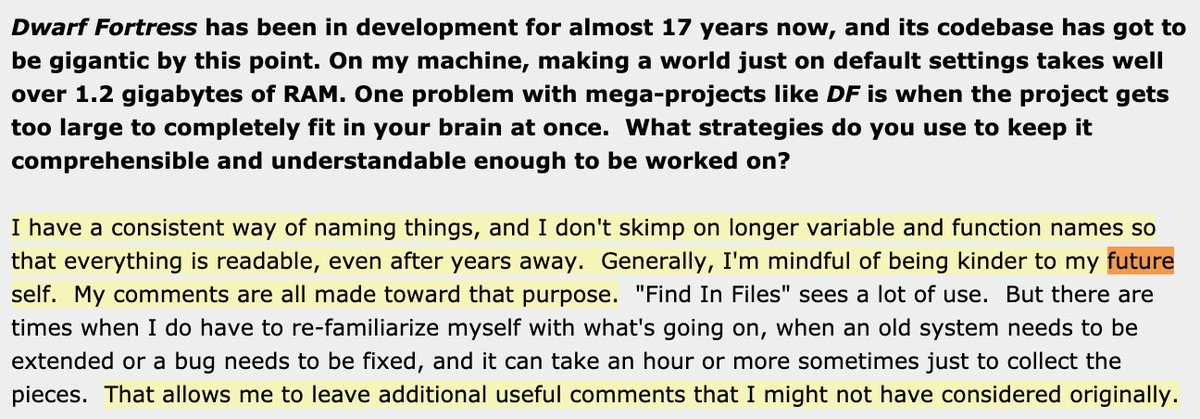It's common to hear #roamcult say "the more you put into Roam the more valuable it gets." Most making this claim haven't dealt with sheer quantity yet, entropy takes longer in Roam vs. competitors. Reverse entropy *can happen, but depends on user behavior. https://twitter.com/JoshuaLelon/status/1259480788741115904?s=20
For context, I'm 5 months in w/ over 3000 pages. LOL @ 5 years. My PKM aim is to identify what seems important, remove what definitely isn't, and leave trails to what's remaining when pre-judgement isn't sufficient. Divergence, convergence, repeat. https://twitter.com/round/status/1245704928686788608?s=20
Your skill and your goals with Roam will develop and change over time, as will your habits and what's important to you. I like Dwarf Fortress developer Tarn Adam's approach. Add/remove comments, connections, and entire notes every time you review. https://gamasutra.com/view/news/343859/QA_Dissecting_the_development_of_Dwarf_Fortress_with_creator_Tarn_Adams.php
Additionally, not everything you do can be as you go. You need to continuously distill and synthesize into what's most valuable. Do it manually. Think of it as creating contextually appropriate index pages with commentary. https://twitter.com/RobertHaisfield/status/1257303216737251328?s=20
Note- this is also the role of writing essays, presentations, etc. Teaching is a fantastic forcing function for building mental models and elaborating on what's important. @paulg: "expect 80% of the ideas in an essay to happen after you start writing it" http://www.paulgraham.com/writing44.html
I like doing these with block references vs. actually moving blocks around because it's simultaneously more concise and links you to the original context. Broader point is to take progressive summarization at a more abstract level than highlights and bolds https://twitter.com/visakanv/status/1174067824412618752?s=20
Note- there have been people who tell me that they don't have time for that. This is the "work" of knowledge work. Doing this now saves you time later solving problems you've already solved but can't find or remember the solutions to because they are buried in sheer quantity.
Queries can help wrangle chaos. This happens through asking more meaningful and (often but not always) more specific questions than before. Super helpful for processing my notes. Actively decide which notes are/aren't quality. Help future you out. https://twitter.com/RobertHaisfield/status/1249026859280424961?s=20
Queries on pages help you organize your notes around the questions that you have, as opposed to just individual, atomic concepts https://twitter.com/dela3499/status/1259483757519740928?s=20
Answering questions doesn't often happen by answering one q. I create "saved search process" pages with queries to save linked reference filters that end up fruitful, articulate unfruitful tags, and then affinity map block references into outlines. Multi-step search process.
These are my current approaches. Will develop and change over time. Another approach I'm exploring is spaced repetition on open questions re @andy_matuschak and adding new thoughts or research each resurfacing, more to explore with spaced repetition generally but I'm early there.
Keeping track of what isn't working for me feels just as important as keeping track of what does. Pruning is just as important as growing. https://twitter.com/RobertHaisfield/status/1259944199471820800?s=20

 Read on Twitter
Read on Twitter


